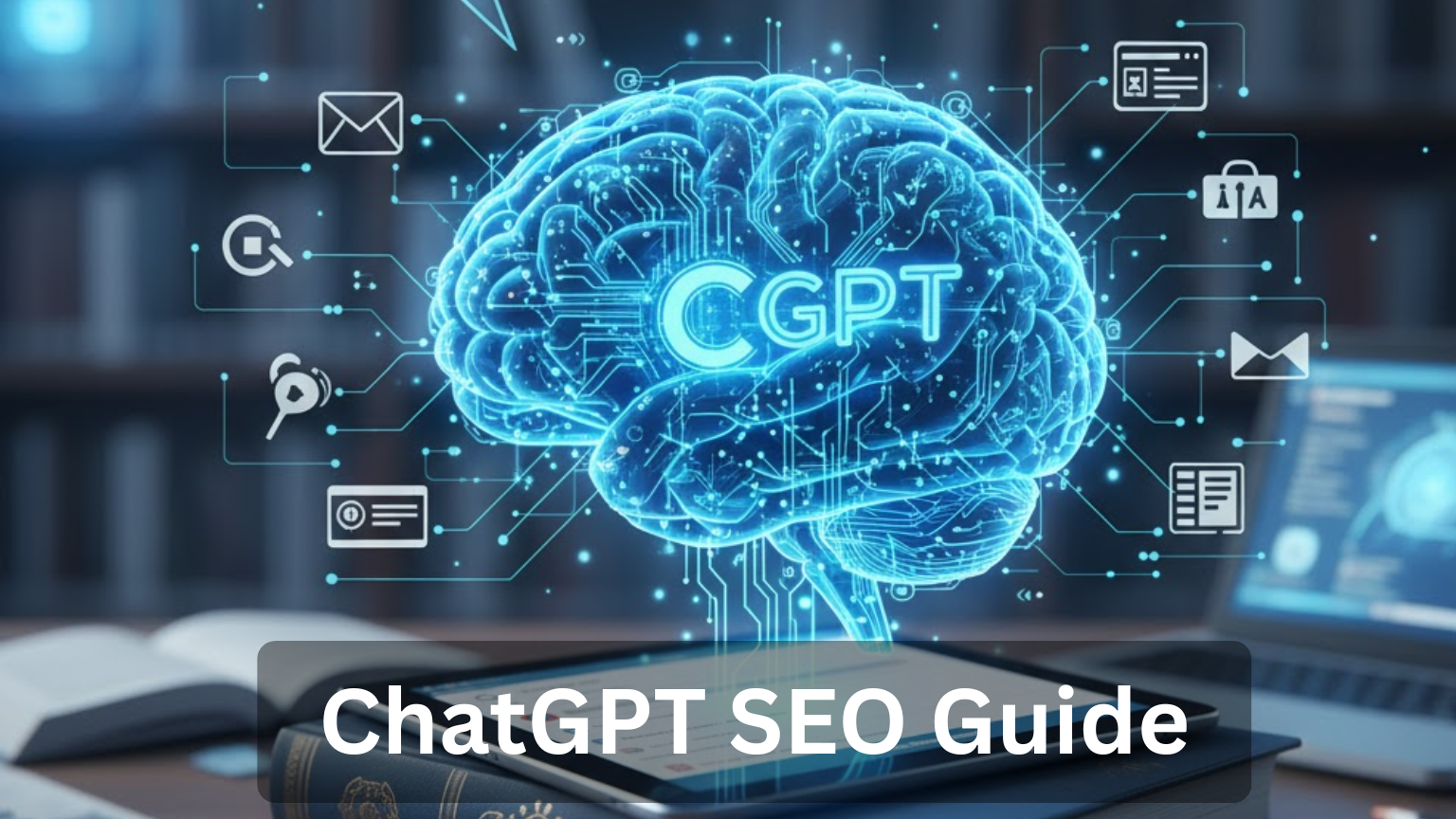Imagine asking a question online and instead of scrolling through links, you instantly receive a polished answer from an AI assistant. That’s the future of search — and it’s already here. With tools like ChatGPT, Google’s AI Overviews, and Bing Copilot changing how people get information, brands and creators face a new challenge: not just ranking on Google, but ranking inside AI-generated answers. That’s where ChatGPT SEO comes in.
ChatGPT SEO isn’t about tricking the system. It’s about structuring your content so AI understands it, trusts it, and cites it. Whether you’re a marketer, blogger, or small business owner, mastering ChatGPT SEO means staying visible in an AI-search world. When AI models like ChatGPT pull content for their responses, your goal is simple: be the source.
In this guide, you’ll learn exactly how to optimize your site for ChatGPT SEO, boost AI search visibility, and increase your chances of scoring AI citations across tools like ChatGPT, Bing, and Google SGE. We’ll break everything down in friendly language — no tech degree required. If you want your brand to show up when AI answers questions… you’re in the right place.
Understanding ChatGPT SEO
Before we dive into strategy, let’s define ChatGPT SEO. Traditional SEO focuses on ranking webpages in Google. ChatGPT SEO, on the other hand, focuses on getting your content referenced, quoted, or linked when AI platforms respond to user questions. The better AI understands and trusts your site, the more likely it is to include you in AI citations.
Why does ChatGPT SEO matter? Because AI search tools may soon become the primary way people find information. As AI search grows, optimizing for AI content visibility becomes just as important as ranking in traditional results. Tools like Google SGE and Bing Copilot already pull answers directly from web pages. If your content isn’t optimized, it risks being ignored and overshadowed by competitors who are ready for the shift.
Think of ChatGPT SEO like teaching an AI how to read your site properly. You’ll use clarity, accuracy, structure, and helpful information — the same best practices that drive human trust. But with ChatGPT SEO, you’re also signaling to language models that your content is reliable enough to inform their output.
In short: ChatGPT SEO positions you as the expert the AI quotes — not the site that gets buried.
How AI Chooses What to Cite
To succeed with ChatGPT SEO, you must understand how AI selects sources. AI doesn’t “browse” the web in real time the same way humans do. Instead, it relies on trained knowledge, indexed content, and retrieval tools to find reliable sources. The key goal of ChatGPT SEO is making it clear your content is trustworthy, current, and easy to reference.
Here’s what improves AI answer ranking:
<!-- wp:list -->- Clear, factual statements
- Strong topical expertise and accuracy
- Credible sources and citations
- Easy-to-parse formatting
- Fresh content
If you practice Google SGE SEO, the rules feel familiar. AI wants authoritative sources. When your content provides structured, plain-language answers, you increase your shot at AI citations and AI snippet optimization.
AI isn’t guessing — it’s pattern matching. It surfaces content that:
- Directly answers user questions
- Uses clean headings and bullet points
- Offers data, stats, or quotes
- Feels objective and trustworthy
In ChatGPT SEO, clarity beats cleverness. Concise, helpful content wins. Your job is to make your answers so strong that AI models naturally pull from them — just like featured snippets, but smarter.
Content Strategies for ChatGPT SEO
The core strategy of ChatGPT SEO is writing content designed to be quoted. Think of each page as a resource. AI loves pages that break things down clearly. To increase AI content visibility, your posts should answer questions in a direct, accessible tone — just like this one.
Use these techniques for powerful ChatGPT SEO:
- Start pages with direct answers
- Create FAQ blocks
- Add summaries and “key takeaways”
- Use bullet lists and numbered steps
- Avoid fluff — clarity wins
If you're trying to optimize
Don't miss your chance to enroll now.🚀 New Batch Starting Soon!
Question: What is ChatGPT SEO?
Answer: ChatGPT SEO is the process of optimizing web content so AI models like ChatGPT reference and cite it in generated answers.
That’s a perfect snippet AI can grab.
Blend human-friendly storytelling with machine-friendly organization. Use conversational tone, short paragraphs, and helpful context — hallmarks of strong LLM SEO writing.
Finally, remember consistency. Publish regularly, target related topics, and build hub pages. The more topical authority you build, the easier it is for AI to trust and cite you. That’s how ChatGPT SEO leads to sustainable traffic.
Technical Optimization for AI
Content is king in ChatGPT SEO, but structure is the castle. AI models rely heavily on formats they can parse easily. If your site supports structured data for AI, your AI search ranking opportunities grow.
Key technical moves for ChatGPT SEO:
- Use schema markup (FAQ, How-To, Person, Organization)
- Add author bios and credentials
- Keep pages fast and mobile-friendly
- Ensure clean internal linking
- Provide updated date stamps
These technical steps help both Google and AI engines assign credibility. Modern Google SGE SEO and AI snippet optimization rely heavily on structured signals.
When you optimize for AI, you're making your content readable to the model — just like you once optimized for crawlers. Include tables, FAQs, and formatted data. Use scannable headlines and strong metadata. All of these reinforce ChatGPT SEO success.
Bonus tip: host supporting evidence. Data charts, PDFs, interviews, and original research increase your trust score. The stronger your authority signals, the more likely you’ll earn AI citations across platforms.
Think of technical tweaks as your ChatGPT SEO multiplier. They tell the machine: “This source is reliable. Use it.”
Proven Tips to Get Cited
Now let's get tactical. Here’s a quick checklist to boost ChatGPT SEO and your chance at AI citations:
- Answer questions at the top of each page
- Create “definitions” for industry terms
- Include statistics with sources
- Write 100-word expert explainers
- Build topical clusters
- Use citations and references
- Update evergreen posts frequently
Example format that tools love:
What is AI answer ranking?
AI answer ranking refers to how likely AI systems are to surface your content in generated answers based on authority, clarity, and relevance.
This format supports LLM SEO and AI content visibility at the same time.
Don't forget authority boosters: interviews, case studies, firsthand experience, and original insights. The more proof you have, the better your ChatGPT SEO performs.
Finally, ask tools directly. Search your niche terms inside ChatGPT, Bing, and Google SGE. See who gets cited — then build stronger, simpler, clearer content than they do. That’s how you win ChatGPT SEO and future-proof your brand against shifts in AI search.
Conclusion
The future of search is conversational, and ChatGPT SEO is your competitive edge. Instead of fighting for blue links, you're positioning your content inside AI answers where users are already looking. By understanding how AI finds and trusts information, you can shape content that earns AI citations, boosts AI search visibility, and strengthens your brand as an expert source.
Remember the keys: clarity, authority, structure, and freshness. When you optimize for AI, you're essentially making it easier for language models to recognize your value. With consistent effort, ChatGPT SEO will help you appear in more answers, attract more targeted traffic, and build long-term trust online — even as search evolves.
Ready to take action? Pick one page today. Add clear definitions, FAQs, and structured sections. Refresh your data. Simplify your language. Every small improvement compounds in ChatGPT SEO and LLM SEO performance.
This is your moment to get ahead. AI isn’t replacing search — it’s rewriting it. Those who master ChatGPT SEO first will own the next era of discoverability. Start today, refine as you go, and watch your brand show up where answers live.



